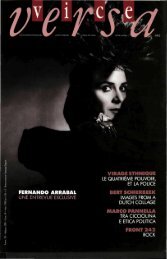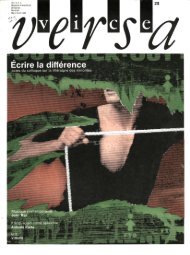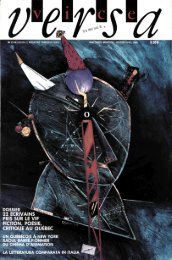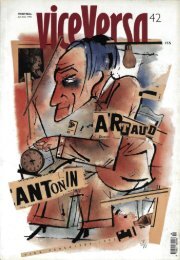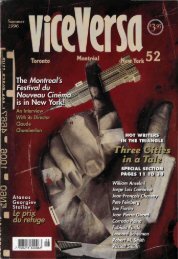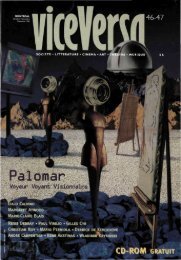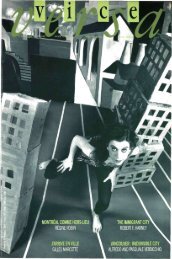N. 16 Italia : Imaginations Passions Parcours - ViceVersaMag
N. 16 Italia : Imaginations Passions Parcours - ViceVersaMag
N. 16 Italia : Imaginations Passions Parcours - ViceVersaMag
You also want an ePaper? Increase the reach of your titles
YUMPU automatically turns print PDFs into web optimized ePapers that Google loves.
5 of poetics and does not allow room for a personal one.<br />
z It is nothing more than something that has been given us<br />
â from the outside, not of our own choice. Pasolini talks of<br />
> this type of thing in terms of an "intellectual ghetto". Yes,<br />
5 we are allowed to write in our own predetermined way.<br />
our own little Italo-Canadian material, but don't step out<br />
too far. It's a way of keeping people at bay, such writing<br />
betrays a "tolerant" attitude on "their" part, but not one<br />
that will go any further, into full acceptance. Any writing<br />
carrying a label like Italo-Canadian is doomed to remain<br />
entrenched in that label. A writing without predescribed<br />
limits is one that will flourish, anything else is doomed.<br />
W.: The last time we talked you mentioned that you<br />
have deliberately avoided the theme of immigration in your<br />
poetry. At the same time you confided to have shared the<br />
same feelings of duality and ambivalence as the rest of us.<br />
Would you elaborate?<br />
RV.: I don't think I deliberately avoid the theme of immigration.<br />
I've never really felt an immigrant. I've felt<br />
alienated, and yes. a feeling of duality, or multiplicity. But<br />
such feelings are a natural result of being in some way different<br />
from others; one does not have to be an immigrant<br />
to feel like that. There is a state of mind that could be labelled<br />
"immigrant" even if one has never emigrated. Even<br />
though I don't talk directly about immigration, I am sure<br />
that it comes through in my work. I don't think it can be<br />
helped. It's not unlike any other writer who moves through<br />
language. To write is to migrate, to be in constant movement.<br />
Language is not a sure bet in one's search for identity.<br />
Language is an attempt on the part of man to control<br />
what is around him. and as such is a reflection of his<br />
paranoid and schizophrenic character. Every person who<br />
picks up a pen leaves himself open to ambiguity.<br />
o<br />
u<br />
Z<br />
<<br />
2<br />
o<br />
z<br />
40<br />
V.V.: The central question in <strong>Italia</strong>n-Canadian writing<br />
is: Who am I? —which mimics one of the three questions<br />
of all Literature (with a capital "1 "): Where did we come<br />
from? Who are we? Where are we going? In Moving Landscape<br />
there is no identity crisis, no search for roots?<br />
RV.: Oh, certainly! Both are present. But, as you stated<br />
in your question, these are basic problems faced by any<br />
writer. I don't see them as posing different problems for<br />
ethnic writers; such writers are working out the same problems<br />
as anyone else. There are two options here: 1) you<br />
give the ethnic writer extra credit and value his writing<br />
more because he is doubly perplexed and better illustrates<br />
a writer's plight or 2) you value the ethnic writer less<br />
because he is stuck in a mode not of his own choice in<br />
which he is unable to express himself fully, and which acts<br />
only as a prison. I don't agree with either one of these proposals.<br />
What I find particularly disturbing is the conclusion<br />
to a paper that I recently read, which stated that <strong>Italia</strong>n-<br />
Canadian writers would not be writers if they did not have<br />
their immigrant experience to write about. I'm afraid that<br />
anthologies and writing tailored to suit a particular ethnic<br />
image proliferate this type of conclusion, and are dangerous<br />
in that they constitute auto-limitations. My identity crisis,<br />
Videofuturismi Suite de lo poge 7<br />
coni (versione TV dell'Orlando) di Carlo Quartucci (/.«<br />
montagna gialla), fecondato dell'esperienza del teatro<br />
d'immagine, il videoteatro è approdato, negli anni '80, a<br />
risultati autonomi che hanno imposto una nuova convenzione<br />
di teatro artificiale. II mezzo video è staio utilizzato<br />
dai videoteatranti in due direzioni, secondo logiche opponibili<br />
ma, in fondo contigue. La prima si avvale della installazione<br />
video per complicare ed esplicare la resa scenica<br />
della performance, richiamando in scena il mezzo, attivizzando<br />
il suo ruolo: esemplare, in quest'ambito, il Prologo<br />
al diario segreto contraffatto di Giorgio Barberio Corsetti<br />
prodotto nel 1985 con la collaborazione di Studio Azzurrouna<br />
pièce agita sotto locchio di 12 videocamere e ritrasmessa<br />
su un sipario di 15 monitor, poi scomposti e inseriti<br />
nella scena a interagire con essa, in muto dialogo di<br />
rimando con i volti, i corpi, i gesti: simultaneità di azione<br />
tra attori in carne ed ossa e interpreti al silicio.<br />
L'altra linea di sperimentazione videoteatrale, la più frequentata<br />
(ricordiamo Genet a Tangeri dei Magazzini.<br />
Ritratto dell'attore da giovane di Tiezzi-Lombardi, Ginger<br />
Ale di Figurelli e Vanzi, Il cavalière azzurro di Masetti<br />
- Solari -Vanzi) è volta, spiega Palladini "a trasbordare e proseguire<br />
la ricerca di scrittura scenica nelle condizioni del<br />
linguaggio video", "imperniato su un rapporto di montaggio<br />
veloce e non consequenziale délie immagini, su una<br />
brillante alchimia di ritmi e segmenti spettacolari che combinano<br />
la sensibilità della scena postmoderna con le metamorfiche<br />
estetiche dei clip musicali"; il tutto immerso e<br />
come circonfuso dalle caleidoscopiche scenografie artificial!<br />
create con I'ausilio del croma-key. E' una sorta di sincronicità<br />
totale, aggiungiamo noi, che coniuga e interseca<br />
musica e danza, teatro e immaginex, dimensioni e colori<br />
e che, in più brevi spazi cronologici, entro una fitta rete<br />
di analogie, stringe un complesso discorso drammaturgico.<br />
Per lo stile sintetico, per i percorsi analogici, per lalterazione<br />
delle coordinate spazio-temporali, per gli effetti sinestetici,<br />
per il sincretismo totale delle techiche, il videoteatro,<br />
nelle migliori opère, ci fa pensare alla realizzazione di<br />
my search for roots takes place in language. I don't write<br />
to find out if I am really <strong>Italia</strong>n or Canadian, or to express<br />
my anguish at having had to leave my native land. 1 write<br />
to question.<br />
V.V.: There is however a search in a different sense.<br />
In fact. Quill and Quire in "New and Forthcoming Books"<br />
describes your collection "as the world seen through the<br />
eyes of an explorer". Travel and discovery are recurrent<br />
themes. In this sense, you are an immigrant?<br />
RV.: Yes, as all writers are migratory. We set out on a<br />
voyage across the page, across language not knowing what<br />
we'll find, or if there will be a return. And if there is a<br />
return, what do we return to? Language. So we're lost in<br />
a labyrinth, and the fun is in trying all the paths and forks<br />
in the road.<br />
V.V: Or am I on the wrong track? For all poetry is<br />
discovery —that is, seeing the ordinary with a fresh eye.<br />
RV: No. You're on the right track about all poetry being<br />
discovery, but more than a fresh eye, it's the want and<br />
the need to look beyond the surface of things, through the<br />
folds of reality: a willingness to leave port without a map<br />
and travel by the stars.<br />
V.V: Reality and illusion are also explored in your<br />
poetry. I'm thinking of such poems as "Ancestors", "Woman<br />
at the Well", and "Moving Landscape". Would you<br />
comment?<br />
RV: The problem is in knowing where one leaves and<br />
the other picks up, and I am not aware of any particular<br />
signs that may aid us in reaching a conclusion in that<br />
regard. So. I'm convinced that our job is not to interpret<br />
reality, but to mis-interpret it. To interpret is too definite,<br />
too sure of itself. Every poem is an attempt, a potential interpretation,<br />
but most likely a mis-interpretation. The reality<br />
of <strong>Italia</strong>n-Canadian writing is one of the things we should<br />
be reassessing. As I said before: I write to question; question<br />
the "real" and "reality" that is assigned to us. I don't<br />
want to be told that my reality is an "immigrant experience."<br />
Who has created this reality for us? Why? And<br />
how can anyone be so sure of what it is to be an <strong>Italia</strong>n-<br />
Canadian writer? The woman in the well poem does not<br />
care as to which is the reality. She accepts the well as one<br />
reality; whether real or not it does not matter. Who is to<br />
say what is illusion and what is reality? We live a reality<br />
un sogno: quello futurista del "teatro totale". Certo: l'impercettibile<br />
freddezza razionale che emana da queste pieces<br />
esprime tutta la distanza dai farraginosi tentativi "a<br />
caldo" degli avanguardisti di allora; tuttavia, le impeccabili<br />
soluzioni formali offerte dalla simultaneità teenotronica<br />
basterebbero oggi a suscitare l'estasi di Marinctti e dar le<br />
ali ai suoi più arditi progetti. •<br />
Militanza senza<br />
appartenenza Suite de lo poge 9<br />
ciativo italiano (1ARCI e l'UDI, ad esempio); la maggior parte<br />
invece sembrano avcrc avuto la loro genesi nel clima di<br />
crisi politica degli anni 70, e quindi esprimono in un modo<br />
più o meno chiaro dei processi di ricomposi/.ione di Identité<br />
che appunto quella crisi avrebbe messo in moto. Sia<br />
per le tradizioni ideologico-culturali assai diverse che questi<br />
raggruppamenti esprimono (cattolica; comunista; laica;<br />
femminista), sia per la divesrità dei terreni sociopolitici e<br />
delle "issues" su cui essi intervengono (ambiente; antinucleare;<br />
psichiatria; ricreazione-cultura, etc), queste esperienze<br />
forniscono nel loro insieme un quadro assai significativo<br />
delle forme di militanza non-partitica che si stanno<br />
sviluppando in <strong>Italia</strong>. Si nota infatti una chiara distanza —<br />
temporale c comportamentale — nci confronti di quei<br />
modelli di militanza che avevano caratterizzato I area extraparlamentare<br />
dai 67 fino alla meta degli anni 70, sempre<br />
legati, anche se in modo ambiguo e contraddittorio. alla<br />
forma partito, e che si nutrivano di una cultura politica<br />
incline ad una visione troppo (e a volte tragicamente) ingenua<br />
del potere.<br />
Uno degli scopi principali di questa indaginc é infatti<br />
quello di cogliere gli elementi di novità contentai in queste<br />
forme di militanza. con un'attenzionc particohirc aile norme<br />
e regolc che reggono la vita interna di queste as» K lazioni,<br />
Importante c anche l'accento che l'indagine mette sull'atteggiamento<br />
di queste associazioni o movimenti nci confronti<br />
della struttura partitica e dell'apparato istituzionale. Anche<br />
se non mancano casi individuali di "doppia militanza" (cioé<br />
militanza in uno dei partiti ufficiali e in una di queste asso<br />
that for our ancestors was an illusion. What happens when<br />
we say we have become disillusioned with reality? See,<br />
there's language with its tricks. Illusion is not reality, but<br />
what is disillusionment with reality? Language, that's what<br />
we have. And what we write on a piece of paper is ...? Well,<br />
1 believe that that's where we should remove ourselves<br />
from our assigned reality and see our "function as an<br />
absence". We are removed from it and we are part of it,<br />
but I'd hate to name it one way or the other.<br />
VV: The word "dream" is a favorite.<br />
RV: Are dreams illusions? 1 have always been fascinated<br />
by the thought that dreams could be our reality. I dream<br />
of realities. Therefore I dream illusions because dreams<br />
can't be realities. Or is it the other way around? What I<br />
am getting at is the total lack of certainty, the ambiguity<br />
in which we live and constantly deny.<br />
W: Other words are "moon", "fish", "water", "wind",<br />
and "fossil". Can we detect a "West Coast" influence in<br />
the use of these words?<br />
RV: All natural elements. All connected. The moon<br />
affects the movement of tide waters; the movement of body<br />
fluids. Wind is in the interspace between the earth and<br />
moon. And fossils are the ancestral animals and plants.<br />
They are symbols that contain signs. They represent<br />
themselves and other systems of signification that I can<br />
only attempt to understand by juxtaposing them. A fossil<br />
is a message. The wind carries messages. The moon has<br />
messages in the form of craters and canals on it. Water carries<br />
sound faster than air. Fish move their lips in a seemingly<br />
silent language. As to the possible "West Coast" influence<br />
that these words may betray, yes, why not? I could<br />
also answer: Which West Coast? Naples is on the west coast<br />
of Italy, and the sea, fish, etc. have always played a part<br />
in the formation of my intellectual touchstones. In such<br />
correspondences may lie the secret for us. and that is where<br />
we should try to work. The editors of Canadian<br />
Literature, for their special issue "<strong>Italia</strong>n-Canadian Connections"<br />
(no. 106), chose two of my poems that clearly<br />
display this link. Both include the word "cactus": one on<br />
the island of Formentera, the other in the interior of B.C.<br />
We exist in the interspace of these distant foci.<br />
VV: You're bilingual. How does this influence your<br />
poetry?<br />
RV: I'm convinced that it is possible to write <strong>Italia</strong>n<br />
poetry in English and English poetry in <strong>Italia</strong>n. Mix up the<br />
syntax, overlap meanings, and other such things. Having<br />
more than one language to work from increases one's<br />
possibilities. I write in both languages, they can work with<br />
each other or separately. I'd like even more languages. Of<br />
course one influence would be found in the reading of<br />
poetry from both languages. Again, it opens up new doors.<br />
It's different from reading things in translation. Often<br />
translation cannot convey nuances. I am not against translation<br />
— as I have already said, it makes up an important<br />
part of my work — but if one can read something in its<br />
original language, so much the better. •<br />
ciazioni), queste esperienze sembrano esprimere una chiara<br />
volontà di azione collcttiva autonoma, volta non tanto ad<br />
intervenire nei giochi del potere, ma piuttosto a creare delle<br />
basi di potere sociale che in un modo o nell'altro dovrebbe<br />
incidere sullassetto politico del paese. I redattori del<br />
volume usano infatti il termine "politica diffusa" per sottolineare<br />
il carattere informale, a volte spontaneo, di questi<br />
comportamenti collettivi, ma che allô stesso tempo produce<br />
organizzazione e impegno individuale.<br />
E' possibile individuare in questo panorama associated<br />
e movimentistico dei nuovi soggetti sociali nel senso<br />
indicato sopra? Questa indagine non fornisce gli elementi<br />
sufficient per rispondere alla domanda, forse perché l'accento<br />
sugli aspetti tipologici di questo fenomeno associative<br />
ha necessariamente ristretto il campo di osservazione.<br />
Ciô the invece emerge chiaramente, ed é messo ben in<br />
rilievo da Giuseppe Cotturri nel suo saggio introduttivo,<br />
é l'effetto che queste esperienze sembrano avère nel produrre<br />
nuova socialità e nuova cultura politica. "Una ricerca<br />
condotta su forme di militanza senza appartenenza' (e cioé,<br />
su forme di impegno politico-culturale che trascendono<br />
i partiti) dà base a una ipotesi che ci pare molto suggestiva.<br />
Si traita dell'idea, o forse ancora soltanto dell'immagine.<br />
di un più vasto soggetto politico-culturale, che si va<br />
definendo in un processo complesso e non indolore, la cui<br />
identità é riconoscibile al di là dei limiti di organizzazione<br />
proposti nelle forme storiche del movimento operaio. La<br />
fase — ed é questo che ci preme — é quella della formazione<br />
di esperienza. di produzione di una cultura altra"'<br />
(pp. 18/19).<br />
Senz'altro é prematura ipotizzare un'altra <strong>Italia</strong> in gestazione,<br />
ma é chiaro che é verso questi fenomeni socioculturali<br />
che il pensiero critico deve volgersi oggi con<br />
urgenza. La possibilità di dar vita in <strong>Italia</strong> non ad uno ma<br />
a tanti "laboratori politici" sembrano enormi.<br />
Sweethearts, the script has changed...<br />
And with it the Stage directions which advise<br />
Lowered voices, genteel asides,<br />
And the while hand slowly turning the dark page.<br />
Kay Boyle. D



